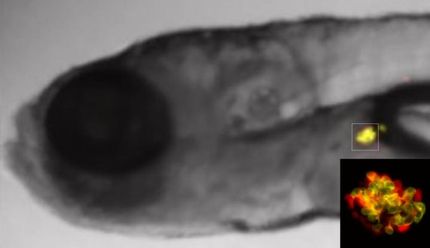A Shot to Stop Diabetes in Mice
Intervention in Immune Regulation Can Prevent Onset of Type-1 Diabetes
Advertisement
Some forms of diabetes could feasibly be prevented. Scientists at the German Research Centre for biotechnology (GBF) in Braunschweig recently were able to do just that in experiments with mice. Animals with a congenital susceptibility for Type-1 diabetes remained healthy when researchers treated them with an immune regulator shortly after birth. The substance used prevented the immune systems in mice from mistakenly attacking one of their own molecules found in the pancreas of the animals.
Type-1 Diabetes is an autoimmune disease triggered by a malfunction of the body's immune defenses. The immune system erroneously identifies certain structures in the body as "foreign objects" and attacks them. In the case of Type-1 diabetes, these "foreign objects" are insulin-producing Langerhans cells in the pancreas.
In one strain of mice, susceptible to this disease from birth, the researchers moved to prevent this effect from the beginning. "Under certain circumstances the immune system can be retrained," says GBF scientist Dr. Dunja Bruder. "It can become accustomed to substances that it would normally attack with a defensive immune reaction." A decisive role is played in this process - known as immune tolerance - by so-called dendritic cells, or DCs. This cell type, which is prevalent in the lymph nodes, is specially designed to present molecular structures to the more aggressive cells of the immune system and to "teach" them which of these molecules should be attacked and which should be tolerated. Some DCs have a restraining, others a stimulating, effect on the immune system.
Dr. Bruder and her research colleagues at the GBF turned their attention to the "restraining" DCs. The cells were targeted with the help of an antibody. They attached the protein molecule responsible for the autoimmune reaction in the pancreas of the mice to the antibody. What they found was that the DCs apparently presented this molecule to the other immune cells and the immune system learned specifically to suppress the undesirable defensive reaction. "The mice treated in this way," notes Dr. Bruder, "did not develop diabetes." The antibody with the attached protein had been injected into the mice on several occasions after birth.
The work group leader, Prof. Jan Buer, stresses that the findings as yet cannot be directly transferred to humans because the molecule studied in the mice strains is not the same one that triggers diabetes in people. However, Dr. Buer is confident that the process could at some point be used as the basis for a diabetes prophylaxis in humans. "It is possible that the same principle might be able to prevent other autoimmune ailments," says Buer.
Original publication: D. Bruder, A.M. Westendorf, W. Hansen, S. Prettin, A.D. Gruber, Y. Qian, H. v. Boehmer, K. Mahnke, J. Buer; "On the edge of autoimmunity: T cell stimulation by steady state dendritic cells prevents autoimmune diabetes." Diabetes 2005, 54(12), 3395-3401.




















































